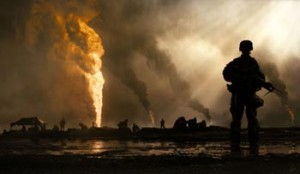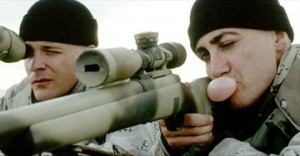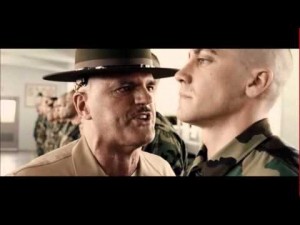From the Chicago Reader (November 4, 2005). — J.R.
Jarhead
* (Has redeeming facet)
Directed by Sam Mendes
Written by William Broyles Jr.
With Jake Gyllenhaal, Peter Sarsgaard, Jamie Foxx, Lucas Black, Chris Cooper, and Skyler Stone
When Apocalypse Now opened in 1979 people argued over its politics. I always thought it was mainly prowar, so I got some satisfaction from seeing an early scene in Jarhead that shows marines at their Mojave Desert base in 1990 watching the movie on video. Itching for the gulf war to start, they whoop it up during the famous “Ride of the Valkyries” sequence, in which the cartoonish Lieutenant Colonel Kilgore ecstatically launches an air attack on a Vietnamese village to the strains of Wagner. Director Francis Ford Coppola, a known liberal, plainly saw the scene as disturbing, but screenwriter John Milius, a known hawk, has often suggested that he saw it as a hoot.
Like most of the good things in Jarhead — a somewhat muddled adaptation by writer William Broyles Jr. (Cast Away) and director Sam Mendes (American Beauty) of Anthony Swofford’s best-selling 2003 memoir — the reference to Apocalypse Now comes from the book, which alludes to movies in its first paragraph. In the second chapter Swofford writes, “There is talk that many Vietnam films are antiwar, that the message is war is inhumane and look what happens when you train young American men to fight and kill, they turn their fighting and killing everywhere, they ignore their targets and desecrate the entire country. . . . But actually, Vietnam films are all pro-war, no matter what the supposed message, what Kubrick or Coppola or Stone intended.” He goes on to argue that civilians see these movies as moral statements — and that military men see them as pornography. “It doesn’t matter how many Mr. and Mrs. Johnsons are antiwar — the actual killers who know how to use the weapons are not.”
Jarhead the movie seems to go out of its way to make being in the first gulf war — a popular war that the U.S. and its allies won — look as unappealing as possible. It’s preoccupied with guys being beaten and branded by their buddies, pissing in their pants, dodging friendly fire, begging for a chance to kill at least one Arab and then not being allowed to, being betrayed by their wives or girlfriends while they’re away, being trigger-happy and going ape shit, getting stuck with latrine duty, vomiting, and getting fried and dehydrated in the desert. This all sounds pretty antiwar to me, but given the attractive way the images fill the screen, it wouldn’t be hard to see at least some of them differently. Certainly the people who made the trailer did: it’s as prowar as anything in Apocalypse Now — all lovely explosions, arresting patterns of light and darkness, and terse, macho voice-overs. Like the movie, it’s put together like a string of music videos, and it ends with a speech by the sergeant who heads up Swofford’s scout-and-sniper platoon: “I love this job. I thank God for every day that he gives me the corps. Hoo-rah.” I suppose this could be read as ironic, but as in Apocalypse Now, the presentation makes it all too easy to read it as straight.
Jarhead virtually begins with a rip-off of the basic-training sequence that opens Stanley Kubrick’s Full Metal Jacket. Maybe Mendes intended a tribute to Kubrick, maybe he wanted to show how marine sergeants imitate their movie counterparts — I can’t tell. I’m even more stumped by the often seemingly arbitrary choices he and Broyles made about what to use from the book. (I didn’t buy the book — a sharp and compelling read — until after I saw the movie.) Why, for instance, does the film bother to mention that Swofford (Jake Gyllenhaal) has a mentally disturbed sister when it does nothing further with this information? Why does it suddenly, without explanation, show him speaking Arabic? Adapting a novel is tricky. Adapting a memoir is even trickier, and Jarhead addresses few of the issues with any consistent strategy.
Mendes has been smart enough to hire some of the best sound and image people in the business for each of his features, including the late Conrad Hall as cinematographer on American Beauty and Road to Perdition and Walter Murch (sound designer and editor of Apocalypse Now) as editor on Jarhead. But he hasn’t been smart enough to transcend the ideological confusions of his scripts; instead he uses his inventiveness and the talents of others to distract us from those confusions. He persuaded a lot of people to skate past the kiddie porn and the uncritical view of the hero’s midlife crisis in American Beauty, and he persuaded many viewers to ignore the infantile aspects of the revenge plot in Road to Perdition — in both cases by tacking on the equivalent of a moral disclaimer at the end. It appears he’s trying to do something comparable in Jarhead by appealing to the antithetical preferences of both pacifists and warmongers. I suspect the warmongers lured in by the trailer will walk out disappointed and the pacifists will come away confused.
Ultimately Swofford’s argument about the difference between the way civilians and military men see Vietnam war movies is too simplistic. We all tend to see what we want to see, and the many people, civilian and military, who see the second gulf war as a disaster will probably think this movie portrays the first gulf war as absurd and futile. But big-screen movies can reward antithetical biases much more easily than books: Jarhead the book, one man’s description of his own disillusionment, is much harder to misread than a movie made by several people with numerous agendas, including commercial ones. And so Jarhead the movie can serve just about any agenda today — and tomorrow.





